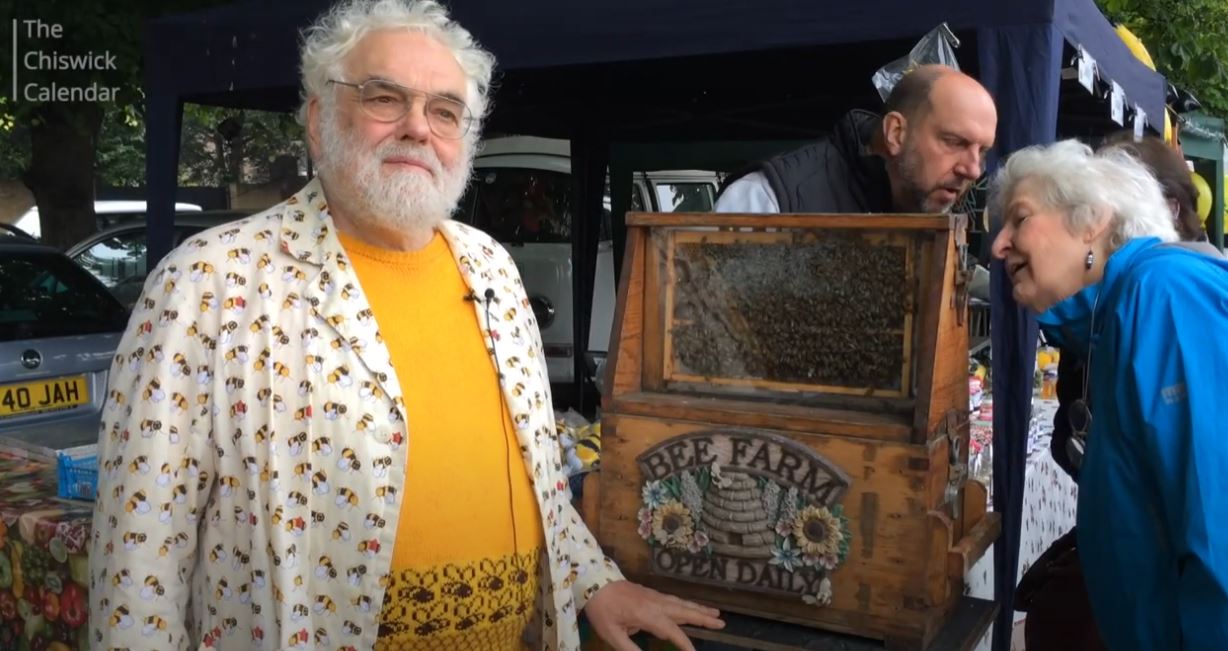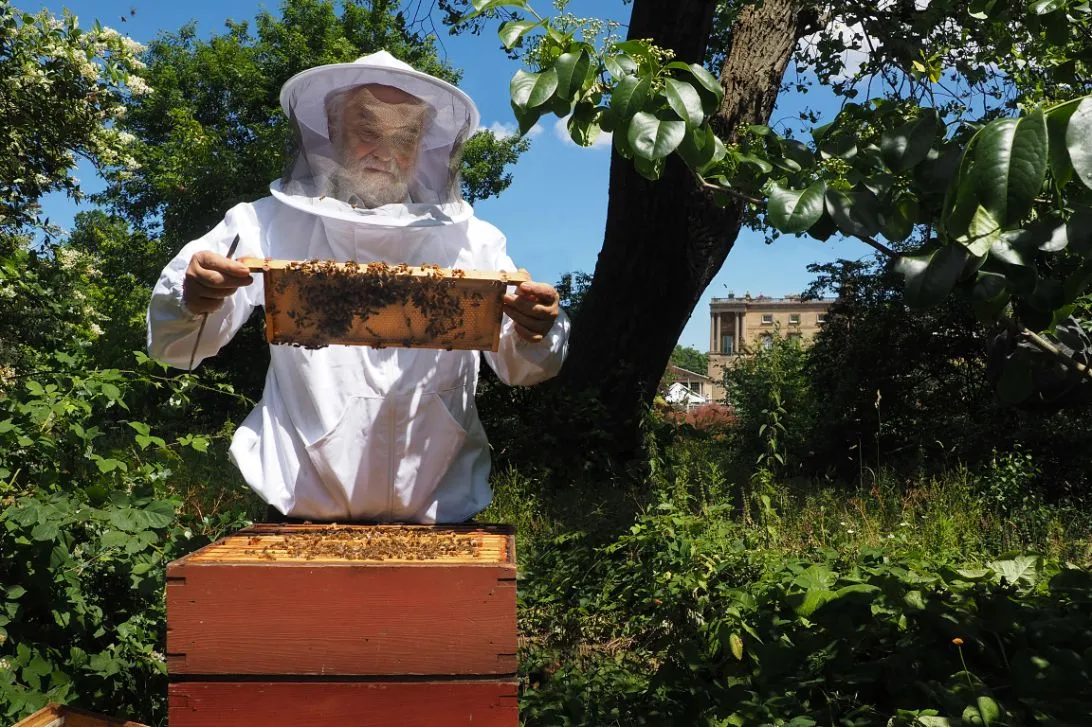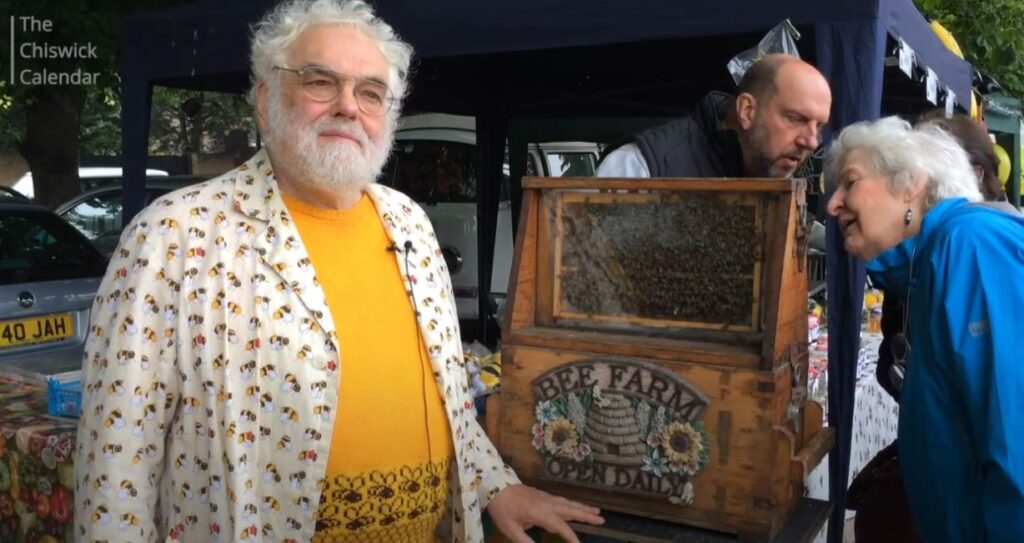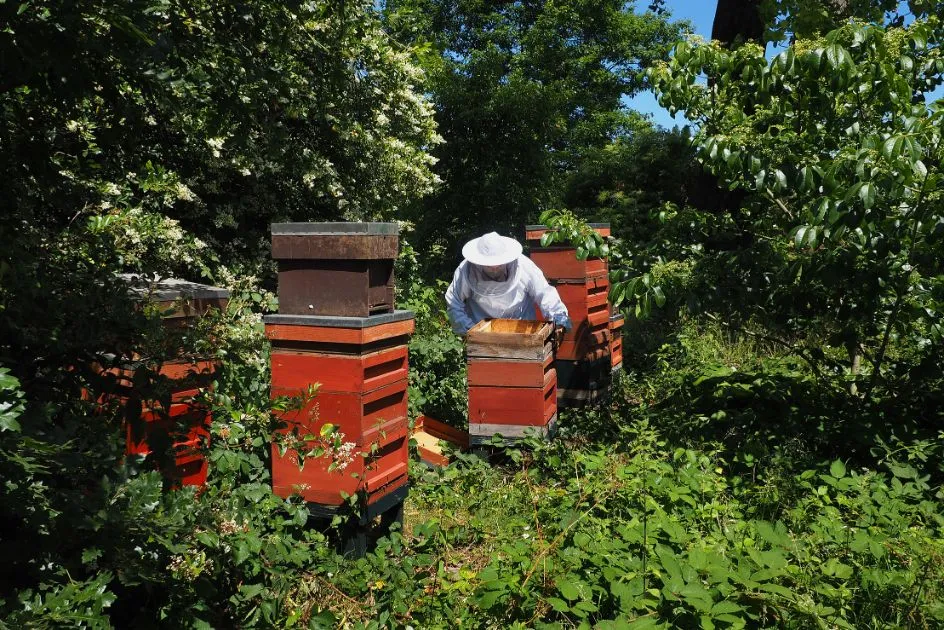As Charles III was crowned King on Saturday at Westminster Abbey, taking over the position of head of state from his mother, Queen Elizabeth II, so another solemn role is being handed over in the gardens of Buckingham Palace – the keeper of the monarch’s bees. John Chapple of Acton, in West London, relinquishes the role after a decade and a half of delivering honey for the Queen’s breakfast.
John Chapple has been the Queen’s beekeeper for the past 15 years. He hit the headlines shortly after she died when it was reported that he had followed the tradition of beekeepers and let her bees know she had died, wrapping the hives in black ribbon. Now 80, he decided that the coronation seemed a fitting point for him to hand over the bees to someone else’s keeping.
John spoke to The Chiswick Calendar about the hobby which has taken over his life, opening doors and giving him the opportunity to travel the world.
The 80-hive ‘hobby’ with bees all over London
John and his bees are always a great attraction at Green Days, the opening weekend of the Bedford Park Festival in Chiswick, West London, in June. There is always a queue of interested children and their parents peering at the glass-sided hive he has on display and a brisk trade in his jars of honey.
Beekeeping started as a hobby for John some 35 years ago when he was working as an engineer on simulators for British Airways.
“When I started, there were very few urban beekeepers. My wife and I have always given each other the most wonderful joke Christmas presents. I give her things like a cement mixer or an angle grinder, and she gives me an electric kettle or a hairdryer.
“She likes honey, so one year I gave her a book about keeping bees in the back garden, and she said ‘lovely – but over to you’.”
John found John Wilson, a man who kept bees on land backing onto Gunnersbury Park in Chiswick, who allowed him to put one of his hives in his back garden. John effectively became his apprentice.
The ‘hobby’ really took off once John retired and at his busiest, when he was chairman of London beekeepers, he had about 80 hives all over London.
“If you’re successful, you keep increasing the number of hives”, he explained. As the nucleus of bees around a queen grows to an unmanageable size, they split. The queen bee goes off and leaves a queen cell behind. In theory, the number of bees could double every year, but in practice, bad weather and disease means they are not quite that prolific.
It all began with a swarm
John’s connection with the royal family started with a swarm of bees in Hyde Park.
“They asked if I could come and collect it. I asked if I could keep some bees there, and the park manager welcomed me with open arms.”
Gardeners like bees as they pollinate the flowers. From Hyde Park, he started keeping bees for the Archbishop of Canterbury at Lambeth Palace, whose head gardener talked to the head gardener at the royal palaces. And so it came about that he began to keep bees in the gardens of Buckingham Palace.
The late Queen loved bees and showed a great interest in them, but he is not allowed by the royal household to talk about his exchanges with her, even though the monarch’s beekeeper is not a paid position, and they are his bees.
John showed me one of his most prized possessions – a big pine cone which Prince George, aged four, picked up in the garden and gave to him as a “present”. John keeps it in a glass dome.
There were four hives initially. Now there are six, and he also keeps two hives at Clarence House, the royal palace just off the Mall, not far from Buckingham Palace. The honey crop goes entirely to the royal household.
Richard Rickitt, co-editor of Bee-craft magazine, told us:
“John has been well-known and much-admired within the London and wider UK beekeeping community for many years. He is an expert beekeeper of long-standing yet has never lost his wonder and enthusiasm for bees and their wondrous lifestyle, communicating that excitement to the public and generations of new beekeepers in his own genial and modest way.
“No one meeting John or listening to his engaging discussions of bees would ever guess that this is a man who for many years supplied the honey for Her Majesty the late Queen’s breakfast – or indeed for world figures including Barack Obama and the Pope.”
Children learning about urban beekeeping at Hen Corner in Brentford, West London. Images ©Hen Corner
If you want to help the bees, plant herbs
John told The Chiswick Calendar that being the royal beekeeper has opened doors for him.
“It has taken me to places I would never have been otherwise. I have seen most of the world, every continent except Latin America.”
The Apis Mellifer species he keeps, ‘London mongrels’, need about 40lb of honey to see them through the winter.
“The skill of the beekeeper is in knowing how much they can take off.”
Interestingly the honey yields in London are going down because so many people are keeping bees, and there is now a surplus of bees in London. When he started beekeeping, there were about thirty keepers in Middlesex that he knew of. Now there are six hundred.
“If you want to help bees, plant herbs. You get the benefit of the herbs, and they get the nectar. Rosemary is good for them, crocuses, snowdrops and lavender especially.”
John will be at Green Days in Chiswick on 10 and 11 June and will be handing over the care of the King’s bees to John House. Whereas John has been his assistant, he will now be John’s, so he will not be losing touch with the royal household entirely.
Read more stories on The Chiswick Calendar
Join the Macfilos subscriber mailing list
Our thrice-a-week email service has been polished up and improved. Why not subscribe, using the button below to add yourself to the mailing list? You will never miss a Macfilos post again. Emails are sent on Mondays, Wednesdays, and Fridays at 8 pm GMT. Macfilos is a non-commercial site and your address will be used only for communications from the editorial team. We will never sell or allow third parties to use the list. Furthermore, you can unsubscribe at any time simply by clicking a button on any email.







Thanks Bridget for a most interesting article. Thoroughly enjoyable
Jean
What a lovely article.
Thank you, Dean.
Thank you Bridget for an interesting read.
John must be proud of his recognition as beekeeper for the both the Royal Family and the Archbishop of Canterbury. He deserves to be.
The photograph that struck a chord fir me is the one with the child with orange gloves. A charming image. Well done that one.
Hi Bridget, thanks for an interesting article.
Bridget,
Thanks for the article. I particularly liked the photo of the glass-sided hive; the expressions of the viewers really made it for me. And, the littlest beekeeper . . .
Here in the United States, there’s a severe shortage of bees; it’s good to hear that somewhere, nature is being taken care of properly.
Well, this subject does make a change from abundant celebrations. Thank you for highlighting an unusual behind the world news story. Very sweet!